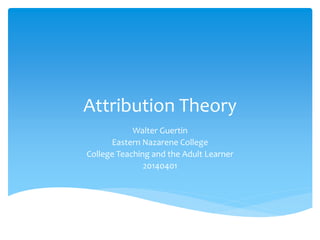
Attribution theory wg
- 1. Attribution Theory Walter Guertin Eastern Nazarene College College Teaching and the Adult Learner 20140401
- 2. “Attribution theory deals with how the social perceiver uses information to arrive at causal explanations for events. It examines what information is gathered and how it is combined to form a causal judgment.” (Fiske & Taylor, 1991). Attribution Theory Definition
- 3. Seeks to explain the cognitive process (perception, memory, reason or judgment) These explanatory inferences are used as to the cause of events In other words, how do we attach meaning to other’s behavior or our own Attribution Theory Assumptions
- 4. Fritz Heider (1958) One of the first to analyze the process Two general categories of explanation as to what caused a particular event Attribution Theory Origins
- 5. Internal – characteristics of the individual ability, attitudes, personality, mood, and effort External – task, other people, or luck Attribution Theory Origins
- 6. Heider established that successes and failures are interpreted by an individual within this causal framework. Attribution Theory Origins
- 7. Julian Rotter (1966) Theory of locus of control Examined individual perceptions of control over events Attribution Theory Origins
- 8. Bernard Weiner (1971) describes: How individuals interpret events How interpretations influence motivation for learning and future learning behaviors Attribution Theory Origins
- 9. Numerous attributions for success and failure such as mood, instructional bias, to illness. Individual successes and failures attributed to ability, effort, task difficulty, and luck Attribution Theory Origins
- 10. Ability, Effort, Task Difficulty, and Luck These are characterized by the casual dimensions of Locus, Stability, and Controllability Attribution Theory Origins
- 11. Locus is either Internal or External to the Individual Stability dimension refers to the perceived ability attribute to change over time; a relative attribute Controllability refers to whether or not the individual can control the factor Attribution Theory Origins
- 12. Understanding motivational consequences of attributions is important to understanding learning behaviors. Students are likely to persist in their efforts at learning when they feel in control Students are likely to feel in control when the factors attributed to their outcomes are seen as internal, stable, and controllable. (Shrunk & Zimmerman, 2006) Predictable Learning Action
- 13. While people strive to find reasons for behaviors, they fall into many traps of biases and errors such as: 1. Fundamental attribution error 2. Culture bias 3. Actor/Observer difference 4. Dispositional attributions 5. Self-serving bias 6. Defensive attribution hypothesis Flaws of Attribution Theory
- 15. Relevance for Adult Learners Changing Attributions with Regard to Academic Performance Helps us to see if our locus internal vs. external Changes learning behaviors Break cycles of self-blame Writing-based attributional-retraining interventions Advise students who are struggling
- 17. Debrief of Attribution Theory
- 18. Discussion
- 19. social psychology. 2014. In Merriam-Webster.com. Retrieved March 28, 2014 from http://www.merriam-webster.com/ dictionary/social%20psychology Fiske, S.T., & Taylor, S.E. (1991). Social cognition (2nd ed.). New York: McGraw-Hill Schunk, D. H., & Zimmerman, B. J. (2006). Competence and control beliefs: Distinguishing the means and ends. In P. A. Alexamder & P. H. Winnie (Eds.), Handbook of educational psychology (2nd ed.). Mahwah, NJ: Lawrence Erlbaum Associates. Demetriou, C., (2011). The Attribution Theory of Learning and Advising Students on Academic Probation. NACADA Journal, Volume 31 (2). References